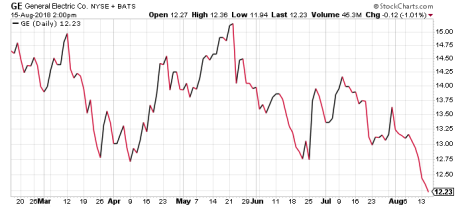It’s been 10 months since I last warned investors about owning shares of General Electric (GE) in “The General Electric Stock Problem: Five Lessons Learned”. Two weeks later, the dividend was cut in half (as I predicted), and GE stock has since fallen 39%, from $20.30 to $12.23.
If you’re relatively new to stock investing, you might consider bookmarking that article. It’s a real “how-to” guide on handling stocks when the companies are going through bad times.
The reason I’m writing to you today is to tell you more bad news: GE stock is not out of the woods yet. Here are the major problems:
[text_ad use_post='129629']
In recent days, GE stock broke below price support. GE traded this year with price support at 12.75, bouncing there in March, April, June and July. Unfortunately, the stock sank even lower in recent days. Odds are strong that investors will now watch the share price drop further.
Tax loss selling season is mere months away. Virtually everybody who owns GE stock has lost money this year. Many of them will sell the stock in order to acquire a capital loss, which can be used on their 2018 income tax return to offset capital gains, thereby lowering their tax burden. The selling pressure will push the share price down even more!
The fundamentals are not compelling. In stock investing, “fundamentals” refers to balance sheet numbers and share price ratios, such as earnings per share (EPS), price/earnings ratio (P/E), cash flow and long-term debt. In the case of General Electric, earnings are falling 10.6% this year, and expected to rise 8.5% next year. Now certainly 8.5% is not a poor number, although you need to know that the number has been revised downward several times this year. So while it’s good that the company is not losing money, the profit outlook is not compelling enough to encourage growth stock investors to buy the stock.
You know who else won’t be buying GE stock? Value investors. That’s because several of the significant fundamental numbers won’t fit their investment strategies. The debt ratio is a little high, the P/E of 13.1 is hardly a bargain and inadequate cash flow continues to cause major problems.
The potential sale of company divisions is making the investment community antsy. There’s just way too much uncertainty. What will General Electric sell? Will they get a fair price? Will the influx of cash be enough to make an impact on cash flow problems? Will more assets need to be sold?
Institutional investors don’t usually want to buy shares of a company with such obvious problems. Everybody has a boss that they have to report to. If they can’t answer the most fundamental questions about General Electric’s outlook, they’re not going to be able to confidently tell their shareholders or their Chief Investment Officer that they should buy GE.
So there you have it. This does not seem to be a prudent time to purchase shares of General Electric. However, the situation is not a complete disaster, and the share price could turn around in the first week of January 2019, when tax loss selling is completed. Until then, tread carefully.
To find out about which stocks I do recommend owning, consider taking a trial subscription to Cabot Undervalued Stocks Advisor.
[author_ad]


